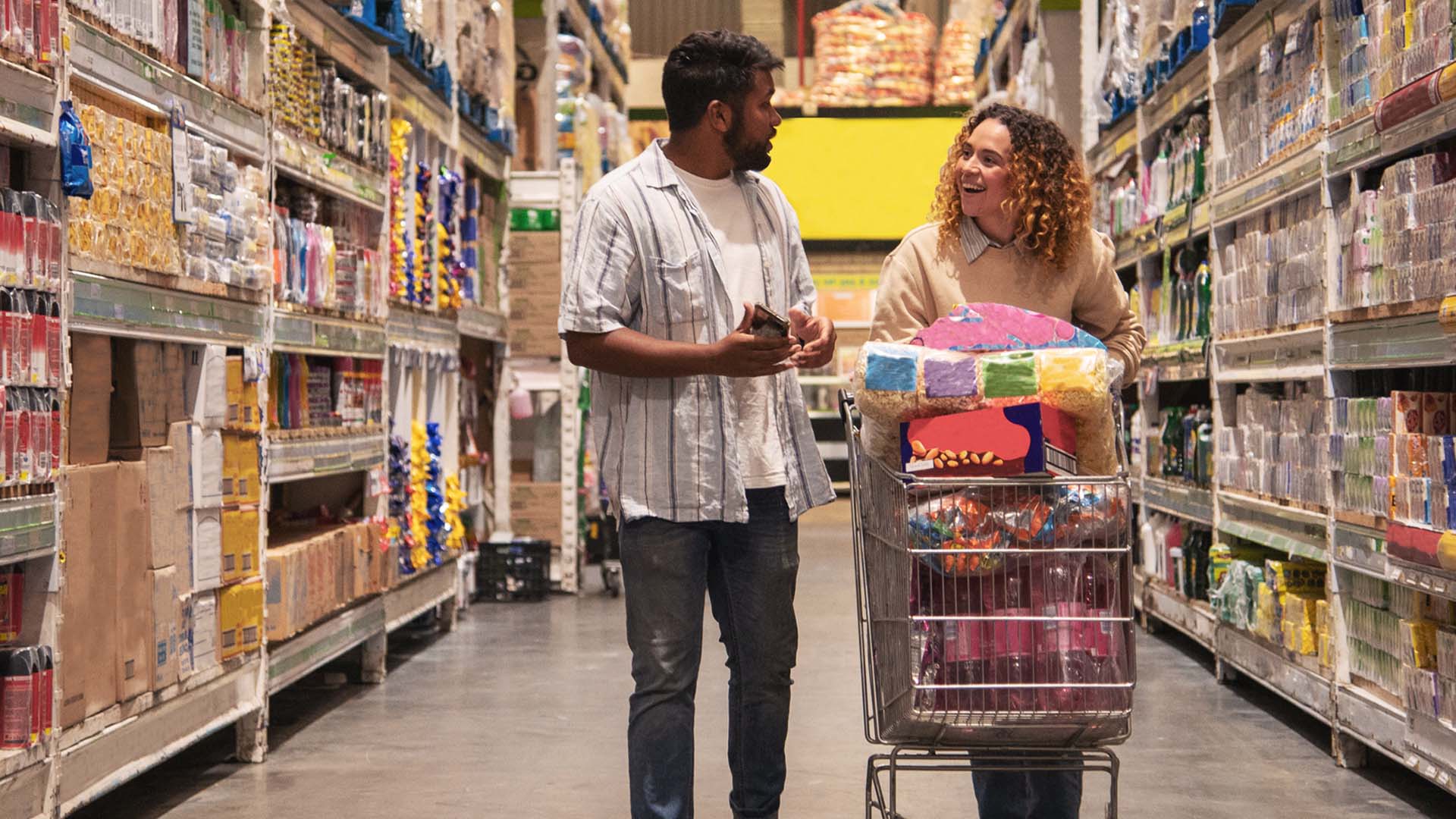Food and many other items we need daily are becoming more expensive, so we’re all looking for ways to reduce our monthly expenses. Have you considered group stockpiling, also called group shopping?
What exactly is group stockpiling?
The principle behind group shopping is simple: A group of people pool their money to buy goods that they all need regularly in bulk, which works out cheaper per unit and saves everyone money.
This strategy is already popular among community stokvels and informal business cooperatives. A group of spaza shop owners, for example, can increase their profit margins by retailing goods that they buy at cheaper wholesale prices, but which none of them could afford to buy wholesale on their own.
By stockpiling as a group, they can also take full advantage of discounts and special offers while they last, without individual members having to overspend.
The same limitations apply to you when you’re shopping for groceries. An everyday necessity like toilet rolls, for example, may cost R20 for a pack of 2, but only R100 for a pack of 18 – a difference of almost R4.50 per roll.
But what if your budget doesn’t stretch to R100 for toilet rolls, with so much else to buy each week? What if you live in a small flat, without much storage space? Bulk buying can be a challenge on your own.
If you’re pooling your money to buy as a group, on the other hand, everyone in our example pays for as many loo rolls as they need and gets them at a unit price of around R5.56, instead of R10. It makes financial sense to join a group that pools your money to buy groceries and other necessities in bulk.
This is doubly true of any products that don’t expire or that have a long shelf life, like cleaning products and dry or canned foods. Not only will group stockpiling get you those goods at a cheaper price now, but it will also reduce the damage inflation does to your budget. The cost of those products in a few months could be significantly higher, so buying more than you need immediately can increase your relative savings.
Different groups have different needs
There are many ways to get a group together, but stockpiling works best when groups are made up of those with similar needs. We’ve already mentioned community stokvels and informal trader associations, but the group that suits you best will depend on your personal circumstances.
Generally, goods are cheaper per unit, per kilogram or per litre in bulk
Are you parents, with several kids spread across the ‘nappies to school supplies’ years? Then your monthly shopping lists are likely to be very similar to those of other parents in the neighbourhood, or at your children’s schools. Do you have extended family, all living in the same town? Do you and your neighbours belong to a community social-media group? Are all your friends and co-workers struggling with rising prices? Do you belong to a sports club or other organisation that meets regularly?
There are many places where you’ll mingle often with like-minded people who need to save money buying many of the same products that you do, so it shouldn’t be too hard to put together your own stockpiling group.
Single people living alone might be those with the most to gain by joining a shopping group. Buying fresh food is often a challenge – meat, dairy products, fruit and vegetables packed in ‘single’ portions tend to have exorbitant prices, but buying them in bulk for a cheaper unit price can be false economy if the food goes bad before you can eat it.
Singletons, therefore, will not only get the benefit of group stockpiling savings on non-perishable goods, but you can also make weekly savings on fresh foods bought in bulk and shared.
All you really need to take advantage of group stockpiling is a group of people who have the same list of weekly essentials to buy, who can meet often enough to handle money collection and distribution of the shopping – and, of course, reliable volunteers to do the shopping.
Group stockpiling strategies
Buying in bulk
Generally, goods are cheaper per unit, per kilogram or per litre in bulk, because of the saving in packaging. One 10kg bag of flour, for example, uses much less packaging than 20x 500g bags.
So, even in stores that stock groceries in both retail and bulk sizes, you can usually expect the largest size to be the cheapest per unit – but you need to check this by working out the unit price every time. Make sure that the price for 20x 500g of flour is in fact higher than the price for one 10kg bag.
There is another challenge when buying from retailers. If a group of 10 people is sharing one 10kg bag of flour, 9 of them will need their own containers to divide up the bag. You can solve this problem, and the issue of working out unit prices in your head, by doing your group shopping at one of the large chains that offer wholesaling to the public.
It’s easier to check that their prices are indeed lower than other retailers’ bulk prices, and although goods are sold in large quantities, they are usually packaged in smaller units within a bulk pack, which makes them easier to distribute among a group.
Maximising discounts and special offers
Stores often offer discounts or run promotions to encourage customers to buy in bulk. For example, you might get a 10% discount on the price of eggs if you buy 5 cartons or more.
But could you fit the cost of 5 cartons into your weekly budget, even with a discount? And will your household be able to use 5 cartons of eggs before they go rotten? Again, this is where a stockpiling group can score by sharing the cost, so that everyone gets the discount and as many fresh eggs as they need.
Talk to family, friends, fellow club members, neighbours, co-workers, or housemates about starting a shopping group
Organising group shopping
It makes things simpler if one individual, or an assigned set of individuals, can take responsibility for all the group shopping. What they buy and where they buy it will be a decision the group makes together, but not everyone needs to be involved in the physical shopping. You could also divide the shopping into categories – for example, one person in charge of cleaning supplies, another who buys the bulk group toiletries, with a third in charge of dried and canned goods, someone else handling other groceries, someone in charge of fresh produce, and so on.
This means that all the group buyers can shop together at one store if you want to cut transport expenses and reduce your group’s carbon footprint. Or else you can each shop individually at different stores, choosing the one that offers the lowest prices for the items in your shopping category, at a time that suits your diary best. If all the designated buyers have bank cards linked to the shopping group’s account, contributing your share or paying for products as the designated buyer is easier to manage.
How do I get involved in group stockpiling?
You can either join an existing group or form your own. Talk to family, friends, fellow club members, neighbours, co-workers, or housemates about starting a shopping group to lower the unit costs of everything you need to buy regularly. Start with the people you know best, and the group can grow over time as you all bring in more colleagues, friends or family members. Apart from saving you money, group stockpiling can help you form stronger bonds in families and communities, as people realise that they can do more together than they can alone.
The Nedbank Stokvel Account is ideal for group stockpiling, provided your group is a registered stokvel. It makes keeping track of members’ contributions simple and offers discounts on groceries and school supplies, as well as R10,000 in funeral cover for each member, at an affordable premium of just R25 per month.








